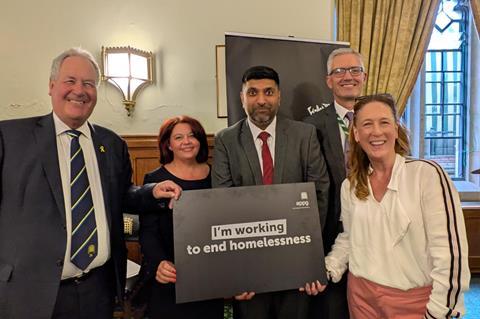Group also argues for a nationally-scaled Housing First programme
Local housing allowance rates should be permanently linked to the bottom 30% of local rents, the All-Party Parliamentary Group for Ending Homelessness has urged.
The group, which includes MPs and peers from across the political spectrum, was reconstituted after last year’s general election and has since convened four roundtable discussions on the homelessness crisis.

This week it published a report based on the evidence accumulated from these sessions, which it described as “a clear actionable path to end homelessness for good”.
It described restoring local housing allowance (LHA) to align with real rents as “the most impactful immediate step” to address homelessness. LHA rates are used to calculate housing benefit (or the housing element of Universal Credit) for tenants renting from private landlords.
The allowance was set at the 30th percentile of rents in 2013, but has been subject to repeated freezes, most recently between 2020 and 2024.
It was most recently uprated to the 30th percentile rate in April 2024.
Aiden Greenall of Crisis, which is part of the APPG’s steering group, said: “Permanently linking LHA to the bottom 30% of local rents would help prevent homelessness and improve health, reducing costs to the Government in the long term.”
Crisis’ analysis of data from the Department for Work and Pensions found that while the 2024 uprating eliminated the shortfall between LHA and rent for 320,000 households, it was less impactful than it could have been due to implementation delays and rent inflation.
Currently fewer than three in every 100 homes listed for rent in England are affordable at the LHA rate, according to the report, down from 12% in 2021–22 immediately after the last uprating.
It said the current freeze, through to 2026, amounted to a real-terms cut.
The APPG report welcomed the governments announcements on building new homes, scrapping archaic vagrancy laws, and establishing an inter ministerial group for homelessness and rough sleeping, but said more needed to be done.
It urged scaling up a Housing First approach as well as other rapid rehousing models, noting that between 80% and 90% of people supported through Greater Manchester’s Housing First had sustained their tenancy over the pilot period and that the scheme had saved the public purse £15,880 per person per year.
It also pointed to Finland’s nationally-scaled Housing First programme, which it said “stands as a beacon”.
Since its introduction, long-term rough sleeping in Finland has declined by over two thirds (68%) between 2008 and 2022.











No comments yet